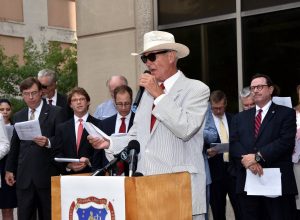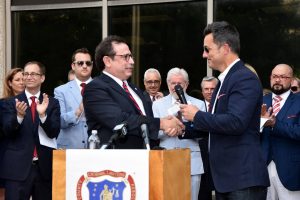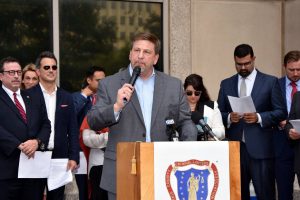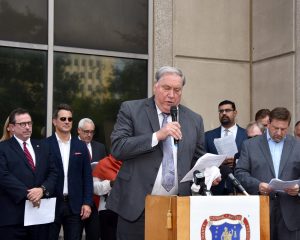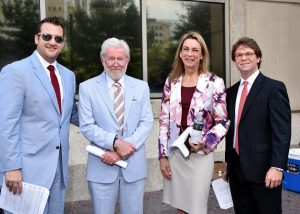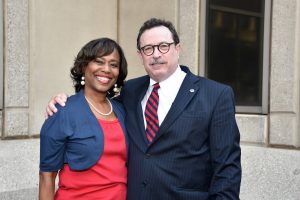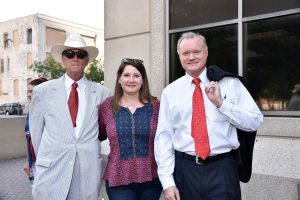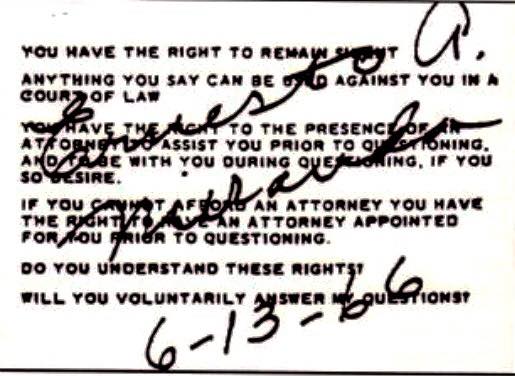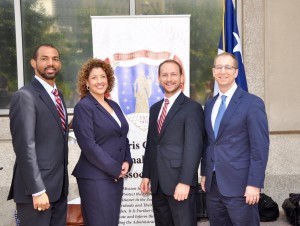 As Free and Independent States, Absolved from all Allegiance to the British Crown, We mutually pledge to each other our Lives, our Fortunes and our sacred Honor. We hold these truths to be self-evident, that all men are created equal, that they are endowed by their Creator with certain unalienable Rights, that among these are Life, Liberty and the pursuit of Happiness. That to secure these rights, Governments are instituted among Men, deriving their just powers from the consent of the governed. That whenever any Form of Government becomes destructive of these ends, it is the Right of the People to alter or to abolish it, and to institute new Government, laying its foundation on such principles and organizing its powers in such form, as to them shall seem most likely to effect their Safety and Happiness.
As Free and Independent States, Absolved from all Allegiance to the British Crown, We mutually pledge to each other our Lives, our Fortunes and our sacred Honor. We hold these truths to be self-evident, that all men are created equal, that they are endowed by their Creator with certain unalienable Rights, that among these are Life, Liberty and the pursuit of Happiness. That to secure these rights, Governments are instituted among Men, deriving their just powers from the consent of the governed. That whenever any Form of Government becomes destructive of these ends, it is the Right of the People to alter or to abolish it, and to institute new Government, laying its foundation on such principles and organizing its powers in such form, as to them shall seem most likely to effect their Safety and Happiness.
July 1, 2016: 7th Annual Reading
In this 240th celebration of the Declaration of Independence, we again assembled to pledge to each other our Lives, our Fortunes and our sacred Honor. In this our 7th annual reading, we stood together to renew our vigor and remind those in power that their power will be checked. As a local activist organization, we, the members of HCCLA, stood together and renewed our promises to our clients and colleagues. We will be the ones who stand against tyranny. We will be the ones who daily fight for individual freedoms and rights so that all will be protected.
In a day where our judiciary thinks they are part of the home team, prosecution and law enforcement, we are the ones who stand to remind them governments can be overthrown. Governments are instituted among men and derive their powers from the consent of the governed. It is not government who decides right or wrong. It is the people. And whenever government becomes destructive, it is the right of the people to alter or abolish it.
We are fortunate to have started this great tradition which has now spread across Texas and is gaining national and even international momentum. Many thanks to Robert Fickman for leading the statewide effort and securing readings in each and every of Texas’ 254 counties.
Our history is reflected in a short synopsis of our years. And we hope to continue to grow our symbolic stand against the abuses in our system.
Additional thanks to Bob Rosenberg who tirelessly assists each year, not only with our reading but with photographs to document.
We’d also like to thank those judges and public officials who were able to attend and share our experience: Judge Kristin Guiney, Justice Marc Brown, Judge Ryan Patrick, Judge Jay Karahan, and District Clerk Chris Daniel. Judges Stacey Bond, Mike Fields, and Maria Jackson sent their regrets.
 Special thanks to ABC 13 and Jaime Zamora for livestreaming our event! Check out some video HERE
Special thanks to ABC 13 and Jaime Zamora for livestreaming our event! Check out some video HERE
Media from our event:
Click2Houston carries the full video of the event HERE
ABC13 Coverage HERE
Breitbart – Texas Lawyers Celebrate in Every County by Reading Declaration of Independence: Started with HCCLA
Texas News quotes member Tom Berg
International Readings by our Members:
Enjoy members Ken and Judy Mingledorff reading in Prague on behalf of HCCLA
 Member Brent Mayr reading on the steps of the Palazzo Publico taken from the Piazza del Campo in Siena, Tuscany, Italy. The relative significance of this location to the Declaration is two-fold. First, the Palazzo was home to one of the first forms of republican government outside of Rome. Second, and more importantly, painted on the walls inside are two famous frescos, The Allegory of Good Government and The Allegory of Bad Government. In The Allegory of Good Government, the central character is guided by Faith, Hope, and Charity, while conferring with the proper virtues necessary for a proper and just ruler: Peace, Fortitude, Prudence, Magnanimity, Temperance and Justice. Appropriately, Justice is depicted balancing the scales held by Wisdom. On the other hand, in The Allegory of Bad Government, the central figure is a demonish looking character with horns and fangs depicting Tyranny. Surrounding him are characters representing Cruelty, Deceit, Fraud, Fury, Division, and War.
Member Brent Mayr reading on the steps of the Palazzo Publico taken from the Piazza del Campo in Siena, Tuscany, Italy. The relative significance of this location to the Declaration is two-fold. First, the Palazzo was home to one of the first forms of republican government outside of Rome. Second, and more importantly, painted on the walls inside are two famous frescos, The Allegory of Good Government and The Allegory of Bad Government. In The Allegory of Good Government, the central character is guided by Faith, Hope, and Charity, while conferring with the proper virtues necessary for a proper and just ruler: Peace, Fortitude, Prudence, Magnanimity, Temperance and Justice. Appropriately, Justice is depicted balancing the scales held by Wisdom. On the other hand, in The Allegory of Bad Government, the central figure is a demonish looking character with horns and fangs depicting Tyranny. Surrounding him are characters representing Cruelty, Deceit, Fraud, Fury, Division, and War.

